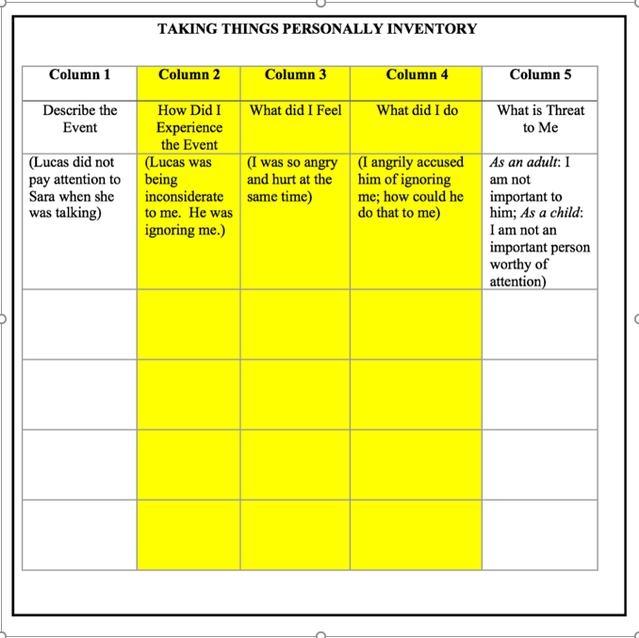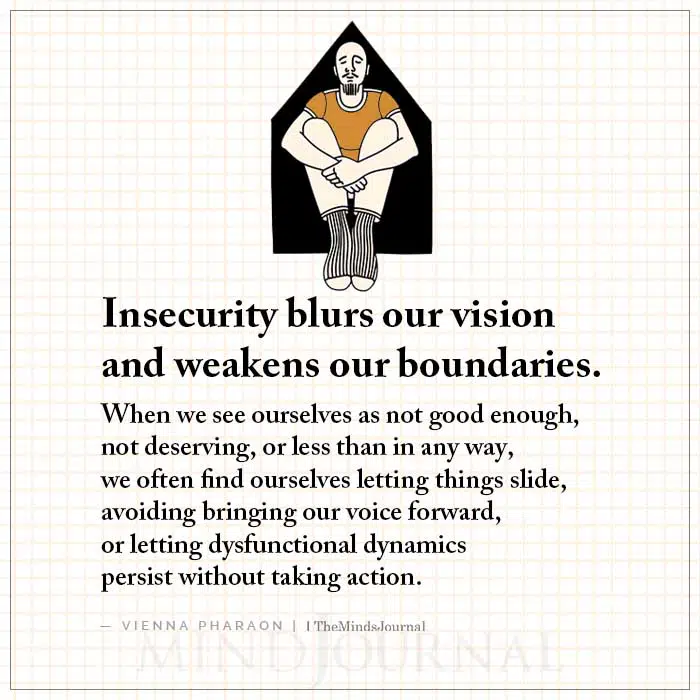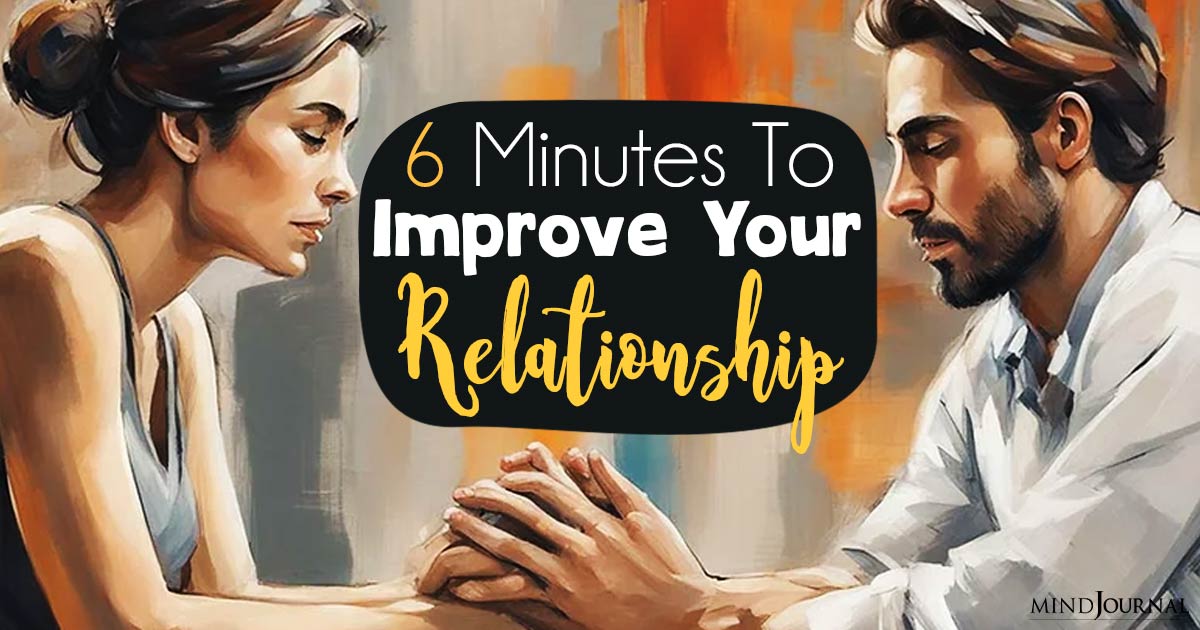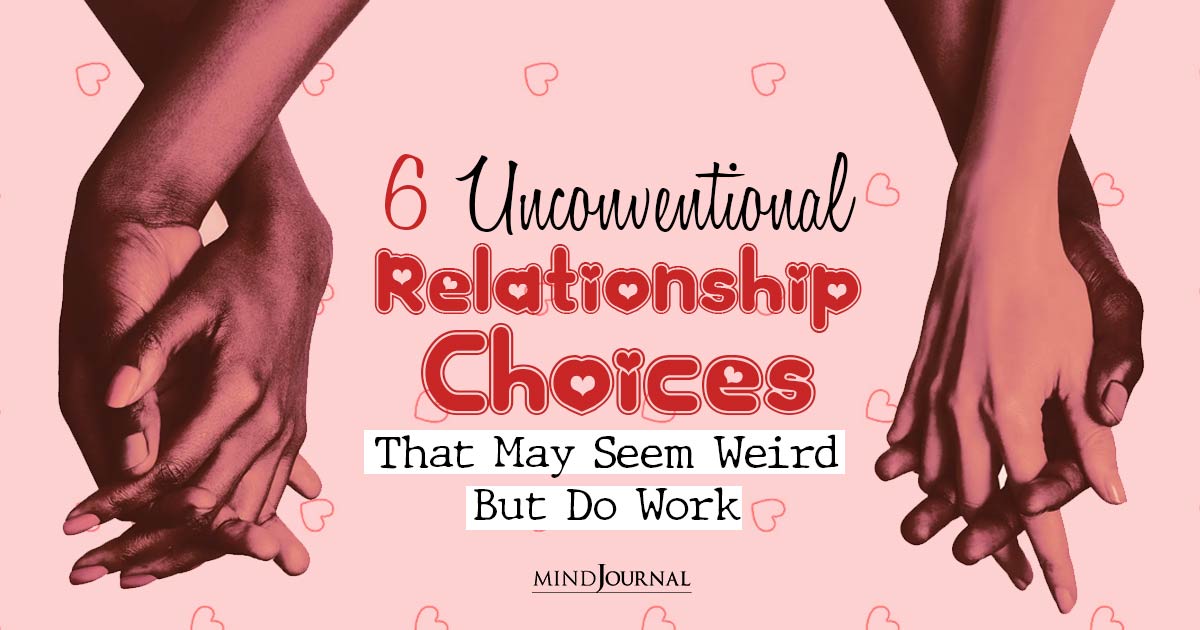It’s perfectly normal for most of us to have moments of self-doubt now and then. However, insecurities can create a gap between you and your partner in a relationship. Learn more about how to deal with personal insecurities in marriage and create a meaningful bond.
A “Taking Things Personally Inventory.”
You: “How can you ignore me like that? I work so hard at being nice to you.”
Your spouse: “I don’t know what you are talking about?”

An interaction like this can lead to a breakdown in the connection between you and your spouse. In this event, Sarah was telling Lucas about her difficult day at work and Lucas was not paying attention to what she was saying…hence her feeling that he was “ignoring” her. She upped the ante by letting him know how “nice” she is to him.
This post is about how to use Sarah’s reflections about her interaction with Lucas as a guide for you in your interactions with your spouse. Sarah’s reaction is an example of her “taking things personally.” “Taking things personally” gets in the way of identifying what may be a problem in the relationship, i.e., her husband not paying attention to her in the way she wants him to. Let’s see what happens.
Here’s how to deal with personal insecurities in marriage
Sarah is “taking personally” Lucas not paying attention to her. She experiences this as him “ignoring” her. It is certainly legitimate to want, even to expect, your spouse will be interested in what is happening to you. However, Sarah characterizes what he did as “ignoring” her, instead of describing that he was not attending to her in the way she wanted him to. Lucas is likely to agree that he was not paying attention to Sarah in the way she wants him to. He is unlikely to agree that he was “ignoring” her.
Sarah’s angry because she thinks that Lucas has “ignored” her. Emotions like anger and fear (being miffed, teed off, annoyed, anxious, etc.) are compelling. And, these emotions go hand-in-hand with how we fall into the trap of characterizing rather than describing our partner’s actions. Take a look at my post “Your Emotions Are Not Things in Your Head” to get a better understanding of how emotions leading to characterizing signal that we are “taking things personally.”
Related: How to Communicate Unhappiness in Your Relationship So Your Partner Really Hears You
Lucas is now on the defensive and Sarah is on the verge of “hunkering down” in her position, when she takes a deep breath and gets out her “Taking Things Personally Inventory” to figure out what is going on within her. Here is a copy of Sarah’s worksheet for you to following along.

Here is what happened. Sarah starts to tell Lucas about an incident that happened to her at work. Lucas does not respond to her or engage with her around her comments. She angrily says to him, “How can you ignore me like that? I work so hard at being nice to you.” Lucas looks up and says, “I don’t know what you’re talking about.”
Related: 5 Reasons Feeling Insecure In A Relationship Is A Red Flag
Sarah’s Personal Inventory
The worksheet is a personal inventory designed to sort out what is going on before this incident flairs into a nasty conflict. Sara starts by sorting out her understanding of the episode by completing Columns 2, 3, and 4. “How Did I Experience the Event,” “What Did I Feel” and “What Did I Do” as follows.
Sara would write “Lucas was being inconsiderate to me” in Column 2, “How Did I Experience the Event.”
Then she would write in “I was very angry and hurt at the same time” in Column 3, “What Did I Feel.”
Finally, she would enter “I angrily accused Lucas of ignoring me and asked how he could do that to me” in Column 4,“What Did I Do?
She might have called him a name, or said “You are so inconsiderate, I can’t believe you act this way.” This kind of accusation can be embellished to make a real case against your partner (e.g. ending up with “You always are …).
Let’s look at what Lucas did in the interaction with Sara. He did not pay attention to Sara in a way that she expected and wanted him to. This description of what Lucas did goes in Column 1, “Describing My Spouse’s Action.”
By comparing Column 1 with Column 2, you can see the difference between describing something that happened and Sarah interpreting it as about herself. It is the difference between Sara accusing Lucas of “ignoring” her and her saying “you did not pay attention the way I wanted you to.”
The first response will put Lucas on the defensive; the second opens the opportunity for discussion.
Further self-reflection is needed to understand how this experience of feeling ignored is threatening. Feeling ignored suggests that Sara thinks Lucas is not interested in her enough to pay attention, she is not a priority for him, he isn’t enthusiastic about being with her, she is feeling discounted, etc. These are the fearful thoughts that behind feeling ignored that are the personal threats to Sara. Learn more about insecurities here.
One tool to use to discover the threat is the Downward Arrow Technique, which is a series of questions that lead to what is threatening in the situation. Here is an example of how the Downward Arrow would work in Sara’s situation:
Q: What does this mean about me?
A: It means Lucas doesn’t care about me.
Q: What does that mean about me?
A: It means he really isn’t a good husband to me.
Q: What does that mean about me?
A: It means I don’t have a husband who cares and respects me.
Q: What does that mean about me?
A: It must mean there is something wrong with me. Maybe I am not worth caring about.
Threat: I am not worth caring about.
You can see that this tool leads Sarah to figure out that she is worried that Lucas may not care enough about her to be attentive. And, this then suggests that she may have worries about being worthy of being cared about.

Taking Your Own Personal Inventory
Pick out an incident that occurred recently between you and your spouse that caused some difficulty between the two of you. You will want to write down the incident as you recall it. Using the event that you identified as causing you to be upset, angry, fearful, anxious, etc. you will go through the same process Sarah did.
- Fill our Columns 2, 3. And 4 first. How did you experience the event, what were you feeling, and how did you react.
- Fill in Column 1 by describing literally what your spouse did.
- Notice the difference between the way you characterized what your spouse did and how it would be described.
- Noting the difference between describing an event and how you experienced it (the distinction between the first two columns on the worksheet) is the difference between identifying problems you can work on with your spouse and reacting to him/her in an accusing way, which often leads to conflict.
- Finally, using your response in Column 2, how you experienced the event, to use the Downward Arrow Technique to figure out what is threatening to you.
Once your self-reflection process gives you a perspective on the situation, you can assess what the problem is, or is not. For example, if Lucas typically does pay attention, once Sarah has worked through her immediate reaction, she may not even perceive the lack of attentiveness in this situation as a problem. However, if lack of attentiveness is more typical of Lucas’s actions toward Sarah, she will want to address this with him as a problem.
If you make the effort, you can get good at this. You can learn about your own personal insecurities (threats). You can learn to interact better with your spouse. Good interpersonal interactions between you and your spouse require you both to be aware of your own insecurities and how they play out in your relationship.
Related: 50 Questions To Ask Yourself To Know Your Deepest Insecurities
When dealing with insecurity in relationships communicating with your partner is the best way out. Express how you feel without blaming or attacking them.
We hope you found this article dealing with personal insecurities insightful, share your thoughts with us in the comments below!
Written by: Catherine Aponte Psy.D. Originally appeared on: Psychology Today Republished with permission








